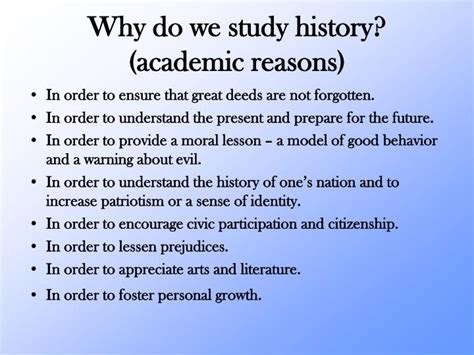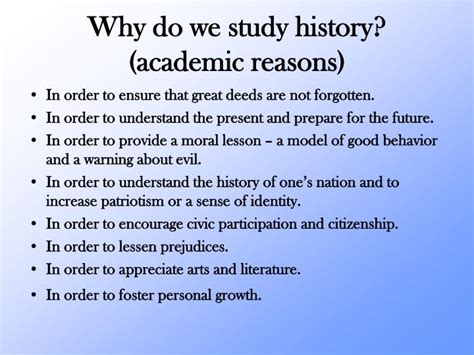Delving into the realm of history is an endeavor that not only enriches our understanding of the past but also equips us with invaluable insights into the present and future. The study of history is a multidisciplinary field that weaves together narratives of human experience, cultural evolution, and societal transformations. By examining historical events, trends, and figures, we can gain a deeper appreciation for the complexities of human nature, the dynamics of power and conflict, and the resilience of societies in the face of adversity. This article aims to explore the significance of studying history, highlighting its relevance to contemporary issues, its role in fostering critical thinking and empathy, and its contribution to personal and societal development.
Key Points
- Understanding historical contexts helps in navigating current global challenges.
- Historical study promotes critical thinking, empathy, and cultural competence.
- Learning from past successes and failures informs decision-making and policy development.
- History provides a framework for analyzing the evolution of ideas, cultures, and technologies.
- Engaging with historical narratives can foster a sense of global citizenship and shared human experience.
The Relevance of Historical Study

Studying history allows us to contextualize contemporary issues within a broader temporal framework. By analyzing historical patterns and precedents, we can better comprehend the roots of current challenges, such as political instability, environmental degradation, and social inequality. For instance, understanding the historical development of globalization can provide insights into its impact on local economies and cultures, while the study of past pandemics can inform public health strategies and policy responses to current health crises. This contextual understanding is crucial for developing effective solutions to modern problems, as it enables policymakers, scholars, and the general public to learn from past experiences and avoid repeating historical mistakes.
Cultivating Critical Thinking and Empathy
The study of history is also instrumental in cultivating critical thinking and empathy. Historical narratives are inherently complex, multifaceted, and often contested, requiring readers to engage critically with sources, evaluate evidence, and consider diverse perspectives. This process fosters analytical skills, as well as the ability to empathize with individuals and groups from different historical and cultural backgrounds. By exploring how people in the past perceived their world, made decisions, and responded to challenges, we can develop a more nuanced understanding of human motivations, values, and behaviors. This empathetic understanding is essential for building more inclusive and compassionate societies, where historical injustices are acknowledged and addressed.
| Historical Period | Key Events | Lessons Learned |
|---|---|---|
| Ancient Civilizations | Development of governance, trade, and cultural exchange | Importance of institutional stability, economic interdependence, and cultural diversity |
| Industrial Revolution | Technological innovation, urbanization, and social change | Impact of technological advancements on society, need for adaptive workforce training, and regulation of industrial practices |
| World Wars | Global conflict, political alliances, and human rights violations | Dangers of nationalism, importance of international cooperation, and protection of human rights |

Historical Study and Personal Development

Beyond its societal benefits, the study of history can also contribute significantly to personal development. Engaging with historical texts, artifacts, and narratives can foster a sense of connection to the past, encouraging individuals to reflect on their own place within the broader human experience. This reflective process can lead to a deeper understanding of personal values, beliefs, and motivations, as well as a greater appreciation for the cultural and social contexts that shape individual identities. Moreover, the skills developed through historical study, such as critical thinking, research, and analytical writing, are highly transferable to a wide range of professional and personal pursuits, making historians and history enthusiasts versatile and valuable contributors to various fields and communities.
Global Citizenship and Shared Human Experience
Finally, studying history can foster a sense of global citizenship and shared human experience. By exploring the diverse histories of different regions and cultures, individuals can develop a more nuanced understanding of the complex interactions and interdependencies that have shaped the modern world. This understanding can promote cross-cultural empathy, challenge stereotypes and prejudices, and encourage active engagement with global issues. In an increasingly interconnected world, the study of history provides a critical foundation for navigating the complexities of global citizenship, promoting peace, understanding, and cooperation among nations and communities.
Why is it important to study history in the modern era?
+Studying history in the modern era is crucial because it provides a framework for understanding current global challenges, fosters critical thinking and empathy, and informs decision-making and policy development. It also helps individuals develop a sense of global citizenship and shared human experience, which are essential for promoting peace, understanding, and cooperation among nations and communities.
How can historical study contribute to personal development?
+Historical study can contribute to personal development by fostering a sense of connection to the past, encouraging reflection on personal values and beliefs, and developing transferable skills such as critical thinking, research, and analytical writing. These skills and perspectives can enrich individual lives, enhance professional capabilities, and promote a deeper understanding of the human experience.
What role does empathy play in the study of history?
+Empathy plays a significant role in the study of history as it allows individuals to understand and appreciate the perspectives, experiences, and motivations of people from different historical and cultural backgrounds. By engaging empathetically with historical narratives, readers can develop a more nuanced understanding of human nature, challenge stereotypes and prejudices, and foster a sense of global citizenship and shared human experience.
In conclusion, the study of history is a rich and rewarding pursuit that offers numerous benefits for individuals, societies, and the global community. By engaging with historical narratives, analyzing past events and trends, and learning from the experiences of previous generations, we can develop a deeper understanding of the world, foster critical thinking and empathy, and contribute to more informed, compassionate, and cooperative societies. As we move forward in an increasingly complex and interconnected world, the importance of studying history cannot be overstated, for it is through this study that we can truly learn from the past, navigate the present, and shape a more enlightened and equitable future.



